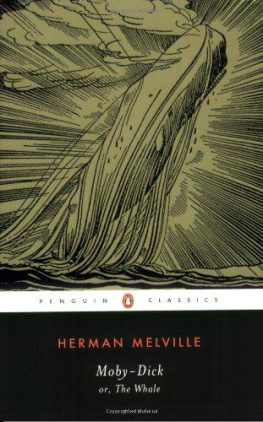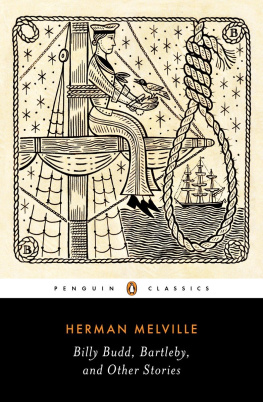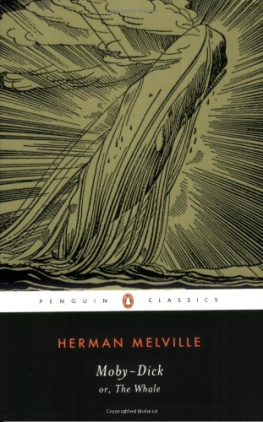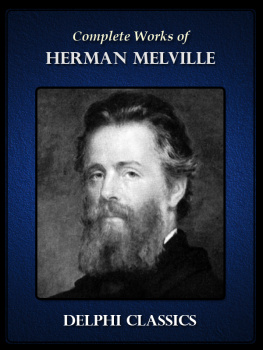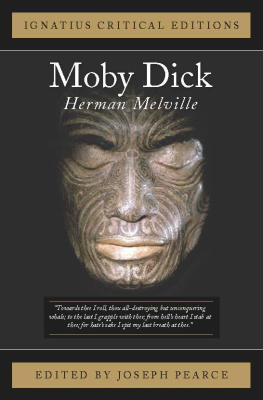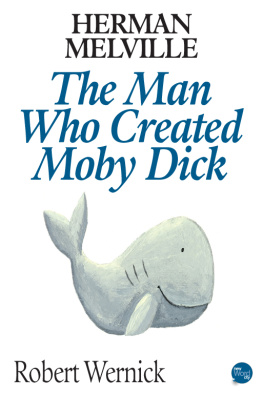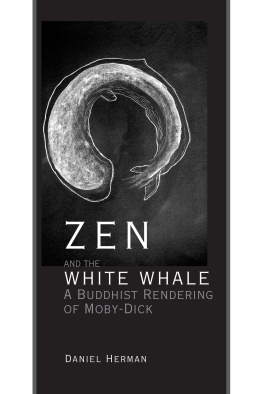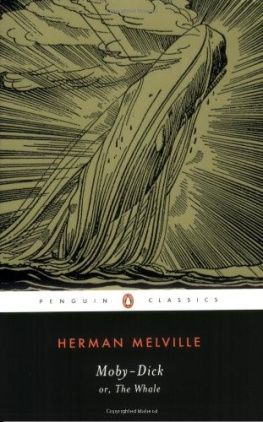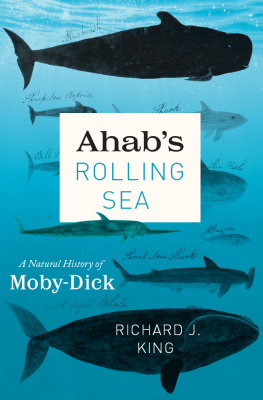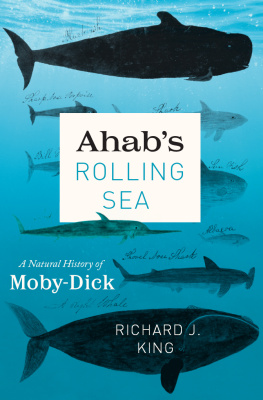

MOBY-DICK
HERMAN MELVILLE was born on August 1, 1819, in New York City, the son of a merchant. His father died when he was only twelve, and Herman worked as a bank clerk and later an elementary school teacher before shipping off on a whaling ship bound for the Pacific. Upon his return, he published a number of books based on his experiences at sea, which won him immediate success. By 1850, he was married and had acquired a farm near Pittsfield, Massachusetts, where he wrote Moby-Dick . His later works, including Moby-Dick , became increasingly complex and alienated many of his readers. In 1863, during the Civil War, he moved back to New York City, where he died in 1891.
NATHANIEL PHILBRICK is the author of the New York Times best-selling Mayflower (Penguin, 2006), a finalist for the Pulitzer Prize for History, and In the Heart of the Sea (Penguin, 2000), winner of the National Book Award. He has lived on the island of Nantucket since 1986.
DR. MARY K. BERCAW EDWARDS is an associate professor of English at the University of Connecticut and the author of Melvilles Sources (1987) and Cannibal Old Me: Spoken Sources in Melvilles Early Works (2009), as well as the editor of Melvilles White-Jacket (2002) and Omoo (Penguin, 2007). An experienced sailor, she has fifty-eight thousand miles at sea under sail as well as twenty-nine years of working aboard the whaleship Charles W. Morgan at Mystic Seaport museum.
HERMAN MELVILLE
Moby-Dick
OR, THE WHALE
A Penguin Enriched eBook Classic
Introduction by
ANDREW DELBANCO
Foreword by
NATHANIEL PHILBRICK
Notes and Explanatory Commentary by
TOM QUIRK
Enriched eBook Features Editor
MARY K. BERCAW EDWARDS
PENGUIN BOOKS
PENGUIN BOOKS
Published by the Penguin Group
Penguin Group (USA) Inc., 375 Hudson Street, New York, New York 10014, U.S.A.
Penguin Group (Canada), 90 Eglinton Avenue East, Suite 700, Toronto, Ontario, Canada M4P 2Y3 (a division of Pearson Penguin Canada Inc.)
Penguin Books Ltd, 80 Strand, London WC2R 0RL, England
Penguin Ireland, 25 St Stephens Green, Dublin 2, Ireland (a division of Penguin Books Ltd)
Penguin Group (Australia), 250 Camberwell Road, Camberwell, Victoria 3124, Australia (a division of Pearson Australia Group Pty Ltd)
Penguin Books India Pvt Ltd, 11 Community Centre, Panchsheel Park, New Delhi 110 017, India
Penguin Group (NZ), 67 Apollo Drive, Rosedale, North Shore 0632, New Zealand (a division of Pearson New Zealand Ltd)
Penguin Books (South Africa) (Pty) Ltd, 24 Sturdee Avenue, Rosebank, Johannesburg 2196, South Africa
Penguin Books Ltd, Registered Offices:
80 Strand, London WC2R 0RL, England
First published in the United States of America by Harper & Brothers 1851
Published by Northwestern University Press as Volume Six of The Writings of Herman Melville , edited by Harrison Hayford, Hershel Parker, and B. Thomas Tanselle 1988
Published by arrangement with Northwestern University Press
Edition with an introduction by Andrew Delbanco and notes and glossary by Tom Quirk published in Penguin Books 1992
Edition with a foreword by Nathaniel Philbrick published 2001
This edition with Penguin Enriched eBook Classic features by Mary K. Bercaw Edwards published 2009
Copyright Northwestern University Press and The Newberry Library, 1988
Introduction copyright Andrew Delbanco, 1992
Notes and glossary copyright Tom Quirk, 1992
Foreword copyright Nathaniel Philbrick, 2001
Penguin Enriched eBook Classic features copyright Mary K. Bercaw Edwards, 2009
All rights reserved

ISBN: 978-1-101-10043-1
(CIP data available)
Except in the United States of America, this book is sold subject to the condition that it shall not, by way of trade or otherwise, be lent, resold, hired out, or otherwise circulated without the publishers prior consent in any form of binding or cover other than that in which it is published and without a similar condition including this condition being imposed on the subsequent purchaser.
The scanning, uploading and distribution of this book via the Internet or via any other means without the permission of the publisher is illegal and punishable by law. Please purchase only authorized electronic editions, and do not participate in or encourage electronic piracy of copyrighted materials. Your support of the authors rights is appreciated.
Contents
MOBY-DICK
Penguin Enriched eBook Classics Features
F OREWORD
Even though I hadnt read a word of it, I grew up hating Moby-Dick . My father was an English professor at the University of Pittsburgh with a specialty in American maritime literature, and that big, battle-scarred book came to represent everything I resented about his job: all the hours he spent in his attic study, relentlessly reading and writing, more often than not with Moby-Dick spread out before him.
Sometimes at dinner he even dared talk about the novel, inevitably in an excited, reverential tone that only exasperated me all the more. And yet, despite my best efforts to look as bored as possible, I found myself hanging on every word. For you see, when my brother and I were very young, my father had told us a bed-time story.
The story was about a whale, a real whale that had rammed and sunk a ship in the middle of the Pacific Ocean. The men had taken to their little whaleboats, and instead of sailing for the nearby islands, they headed for South America, thousands of miles away. When a rescue ship found them three months later, only a few of the men were left alive, and in their hands were the bones of their dead shipmates. (That my brother and I grew up without permanent psychological damage is a testament to our mothers remarkable parenting skills.) I was a little hazy on the details, but I understood that Moby-Dick had something to do with that ship-ramming whale. But, of course, there was no way I was going to crack open the novel and find out for myself.
I resisted until my senior year in high school when my English teacher made it clear that I had no choice but to read Moby-Dick if I was going to graduate in the spring. By that point I had developed an insatiable love of sailingnot your normal recreational activity for a teenager from the Steel City. For reasons too improbable and complex to go into here, I had dedicated myself to racing a Sunfish sail-boat, practicing every weekend on a little manmade lake about an hour outside the city. The previous year Id qualified for the Sunfish World Championship in Martinique. I finished near the bottom of the fleet, but I was hooked. The exotic tang of saltwater had intoxicated me; I found myself dreaming about the tide-heave of the sea. For me, a shy kid in a big urban high school, sailing seemed my only hope of escape. Then, in February of 1974, I discovered Herman Melville.
The voice of Ishmael, the novels narrator, caught me completely by surprise. I had expected to be bored to death, but Ishmael sounded like the best friend I had always hoped to find. In the first paragraph he admits to a state of almost clinical depressiona damp, drizzly November in my soulto which any adolescent can relate. But not to worry, Ishmael reassures us, he has found a solution to this condition. Instead of doing damage to himself or to others, he seeks solace in the sea. Whats more, he insists, he is not alone: If they but knew it, almost all men in their degree, some time or other, cherish very nearly the same feelings towards the ocean with me. As proof, he describes the city of New York on a Sunday afternoon, its cooped-up inhabitants lingering on the waterfront, looking out longingly toward the sea in search of the ungraspable phantom of life.
Next page
